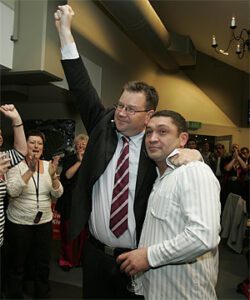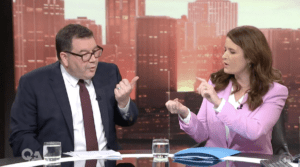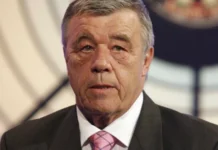Grant Robertson is a New Zealand politician affiliated with the Labour Party. He has held the position of Minister of Finance since 2017 and served as the 19th Deputy Prime Minister of New Zealand from 2020 to 2023.
Bio/Wiki
Age- 51 years
Height- 1.73m
Born- 30 October 1971
Birthplace- Palmerston North, New Zealand
Full name- Grant Murray Robertson
Spouse- Spouse: Alf Kaiwai (m. 2009)
Profession- Politician
Nationality- New Zealand
Party-New Zealand Labour Party
Office- Minister of Finance of New Zealand since 2017
Previous offices- Deputy Prime Minister of New Zealand (2020–2023), MORE
Election 2023 Finance Debate: Grant Robertson vs. Nicola Willis Clash
Family
Grant Robertson, the youngest among three brothers, was born in Palmerston North. He hails from a Presbyterian family that resided in Hastings before establishing their home in South Dunedin. Initially, his mother was a homemaker, later transitioning into a teaching profession. His father worked as an accountant but faced legal consequences in 1991 when he was convicted of embezzling approximately $120,000 from his law firm. Additionally, Robertson’s grandfather, Bob Wilkie, made unsuccessful attempts to represent the Labour Party in the Wairarapa electorate during the 1954 and 1957 elections.


Partner
Robertson currently resides in Northland, Wellington, alongside his partner Alf. Their connection originated from their shared participation in rugby as members of the Wellington-based Krazy Knights, which is New Zealand’s first gay rugby team. Following a decade-long relationship, they celebrated a civil union ceremony in January 2009.
In his inaugural statement on December 9, 2008, Robertson made a subtle reference to his sexuality, acknowledging it as a component of his identity but not its entirety:
I am proud and comfortable with who I am. Being gay is part of who I am, just as is being a former diplomat, a fan of the mighty … Wellington Lions, and a fan of New Zealand music and New Zealand literature. My political view is defined by my sexuality only inasmuch as it has given me an insight into how people can be marginalised and discriminated against, and how much I abhor that. I am lucky that I have largely grown up in a generation that is not fixated on issues such as sexual orientation. I am not—and neither should others be.


Education
Robertson completed his high school education at King’s High School in Dunedin, where he held the position of head boy. Following this, he pursued political studies at the University of Otago, earning a Bachelor of Arts degree with honors in 1995. His honors dissertation focused on the restructuring of the New Zealand University Students’ Association during the 1980s. Robertson also took on leadership roles, serving as the President of the Otago University Students’ Association in 1993 and later as co-president of the New Zealand University Students’ Association in 1996.
Career
Upon returning to New Zealand during the first term of the Fifth Labour Government, Robertson assumed the role of a ministerial advisor, initially serving under the Minister for the Environment, Marian Hobbs, and subsequently under Prime Minister Helen Clark. During his tenure in Clark’s office, Robertson was reportedly referred to as “H3” during the 2005 general election, in a playful reference alongside “H1” and “H2,” denoting Clark and her Chief of Staff, Heather Simpson, respectively.
Following the 2005 election, Robertson transitioned out of the Prime Minister’s office to take on the position of Senior Research Marketing Manager for the University of Otago, stationed at the Wellington School of Medicine.
Towards the end of 2006, Marian Hobbs, the incumbent Member of Parliament (MP) for Wellington Central, declared her intention to retire from politics at the upcoming 2008 general election. In the wake of her decision, Grant Robertson emerged as a leading candidate for the position and was subsequently chosen uncontested as the candidate for Wellington Central.
Robertson orchestrated a well-organized campaign that centered on local concerns, including issues like the closure of the Crossways Community Centre and challenges facing the Public Service. Additionally, he played a role in establishing an inner-city residents’ association in Wellington.
For the 2008 general election, the Labour Party’s candidate list featured Robertson at the 46th position.


Career in Parliament
2008–2011 (49th Parliament): Represented Wellington Central, listed 46th, as a member of the Labour Party.
2011–2014 (50th Parliament): Continued to represent Wellington Central, listed 14th, still with the Labour Party.
2014–2017 (51st Parliament): Maintained his role in Wellington Central, listed 3rd, as a Labour Party member.
2017–2020 (52nd Parliament): Continued representing Wellington Central, listed 4th, under the banner of the Labour Party.
2020–present (53rd Parliament): Currently serving in Wellington Central, listed 3rd, as a member of the Labour Party.
Net Worth 2023
Grant Robertson is believed to have an estimated net worth of approximately $7 million, with an annual salary in the vicinity of $350,000.
2023 Finance Debate with Nicola Willis
Labour and National’s finance spokespeople, Grant Robertson and Nicola Willis, engaged in a heated and intense debate during TVNZ’s Q+A finance debate, marking one of the most contentious discussions of the campaign so far. In the chaotic opening segment, all three participants – Robertson, Willis, and moderator Jack Tame – spoke simultaneously, unwilling to yield ground. Willis pledged tax cuts and a surplus, while Robertson argued that achieving these goals would require substantial cuts to public spending.
Eventually, policy details were extracted from both candidates. Willis vowed to bring the budget to surplus earlier than Labour but noted a catch. Treasury’s most recent forecasts, the Pre-election Economic and Fiscal Update (Prefu), projected a government surplus in 2027. Willis claimed National would reach a surplus in the same year, contending that Labour’s spending would delay it further. However, she did not commit to delivering a surplus earlier than 2027.


Willis’ argument rested on the fact that even before the Covid-19 pandemic, Labour exceeded its budgetary projections in most of its budgets. Nevertheless, this pledge marked the first time in a long time that National could not promise a more favorable fiscal trajectory than Labour.
Robertson raised concerns from economists regarding the assumptions underlying National’s tax plan, suggesting a potential hole of over half a billion dollars annually in the plan’s cost. He argued that Willis would need more significant spending cuts than promised due to National’s revenue assumptions not adding up.
Willis assured that she would implement her tax plan if National won the election but refrained from committing to the exact tax changes promised by National, citing dependence on economic conditions. She emphasized that both National’s tax plan and the forthcoming fiscal plan had buffers to ensure delivery of promises even if conditions change.
When asked if she could guarantee the delivery of her plan if National didn’t achieve the projected revenue, Willis said she couldn’t, as revenue depends on economic conditions.
Willis also clarified that she would not dismiss Reserve Bank Governor Adrian Orr, opting instead to review the bank’s performance during Covid-19. She reiterated that the Governor operated independently of the government.
The debate unfolded amid polling showing that 65% of New Zealanders believed the country was on the wrong economic track, compared to 19% who thought it was on the right track, although these sentiments didn’t necessarily translate into a desire for a change in government.
Read Also:Bob Menendez Biography












































